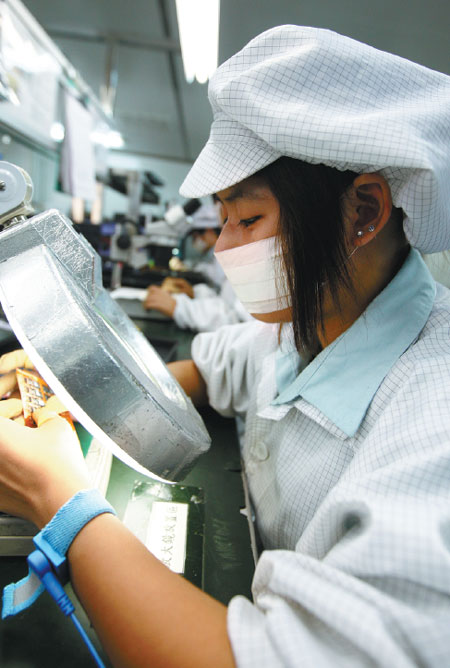Dongguan invested in industries
|
A worker checks the circuit chip at a display manufacturing plant in Dongguan, Guangdong province. The city, known as a manufacturing hub in the country and the world, is aiming at sustainable economic growth. Chen Fan / for China Daily |
Mayor says crackdown on sex trade will not lead to economic slowdown
The economy of Dongguan in Guangdong province will maintain sustainable development this year, although public concerns have already been spreading over a possible slowdown after a campaign against prostitution in the city since early February, a senior government official said.
Yuan Baocheng, mayor of Dongguan, said the city's economy is expected to increase by 9 percent year-on-year in 2014 because it will make a breakthrough in industrial upgrading and a number of key high-tech projects will receive investment.
"As one of the world's important manufacturing hubs, Dongguan has never relied on the illegal sex trade industry for economic growth," Yuan said.
A three-month sex-trade crackdown, following media exposures of a rampant prostitution in Dongguan, in the heart of the Pearl River Delta, put the city into the spotlight, with growing concerns over a possible economic slowdown.
Early media reports estimated that at least 300,000 people work in the sex industry in Dongguan. It was reported the sector, together with related services, could account for 10 percent of the local economic output. The figures could not be officially confirmed.
"I have never admitted that Dongguan is the 'sex capital' of China. The city has only one name - Dongguan. It occupies a leading position in the world's manufacturing industry," Yuan told China Daily, adding the investigation into the illegal sex trade is still in progress and the local authorities will make the utmost effort to improve the business environment by preventing rampant prostitution in the future.
"We are bracing ourselves for a turning point in the economic structure," Yuan, also a deputy to the National People's Congress, said during the annual session of the NPC in Beijing.
"If we successfully make a breakthrough in industrial upgrading, the city's economy will maintain an increasing momentum in the years ahead," he added.
Dongguan's economy grew by 9.8 percent year-on-year in 2013, the highest growth rate since 2009 when the city was hard hit by the global financial crisis.
"The boost to the economy was due to continuous efforts to transform the economic growth model, with the industrial structure being greatly optimized in the last few years," Yuan said.
"One of our major efforts to upgrade the traditional processing industry was to encourage export-oriented businesses to focus more on the domestic market in recent years," Yuan said.
Dongguan has more than 10,000 foreign-invested companies, which used to depend heavily on the overseas market for business growth. A vast number of labor-intensive and processing businesses helped the city become one of the world's most important manufacturing hubs in the past two decades.
The sales revenue of export-oriented companies in the domestic market grew by 9.9 percent year-on-year to 288 billion yuan ($47 billion) in 2013, according to Yuan.
"The increased value in the domestic market represents an efficiency of measures in transforming the economy," Yuan said.
A growing number of high-tech enterprises, which have emerged in recent years, have also helped the city better cope with the economic downturn, according to Yuan.
"We have attached great importance to transforming the economy from one with a labor-intensive manufacturing sector to one emphasizing advanced technology," Yuan said.
Dongguan has so far developed more than 4,000 high-tech enterprises, with the output value of high-tech products accounting for 36.5 percent of the city's economy in 2013, according to local government sources.
Moreover, exports of high-tech products from the city rose to $33.6 billion last year, an increase of a little more than 13 percent year-on-year, representing an increased proportion of all exports, sources at the Dongguan Economy and Information Bureau said.
Construction of a number of key industrial projects, with combined investment of more than 60 billion yuan, will begin this year, according to Yuan.
"Because up to 99 percent of businesses in Dongguan are small and medium-sized, we will not give up efforts to help them expand," Yuan said.
More efforts will be given to upgrade traditional industries because products made in the city already make up a large share in the international market, according to Yuan.
"One out of 10 pairs of shoes in the world and one out of five sweaters are made in Dongguan," Yuan said. Priorities will be given to introduce high-tech facilities and innovation to help traditional manufacturers upgrade their businesses, according to the mayor.
Dongguan's exports are expected to grow by 5 percent year-on-year in 2014, after realizing a 6.9 percent year-on-year increase to $90.86 billion last year.
Lin Jiang, head of the public finance and taxation department of Lingnan College at Sun Yat-sen University, said Dongguan's economy would continue an upstream trend if the local authority makes more effort to upgrade traditional industries.
"No city in the world will rely on an illegal sex trade industry for economic growth. The crackdown on prostitution shows an urgent need for the local government to accelerate its economic restructuring," said Lin.

























